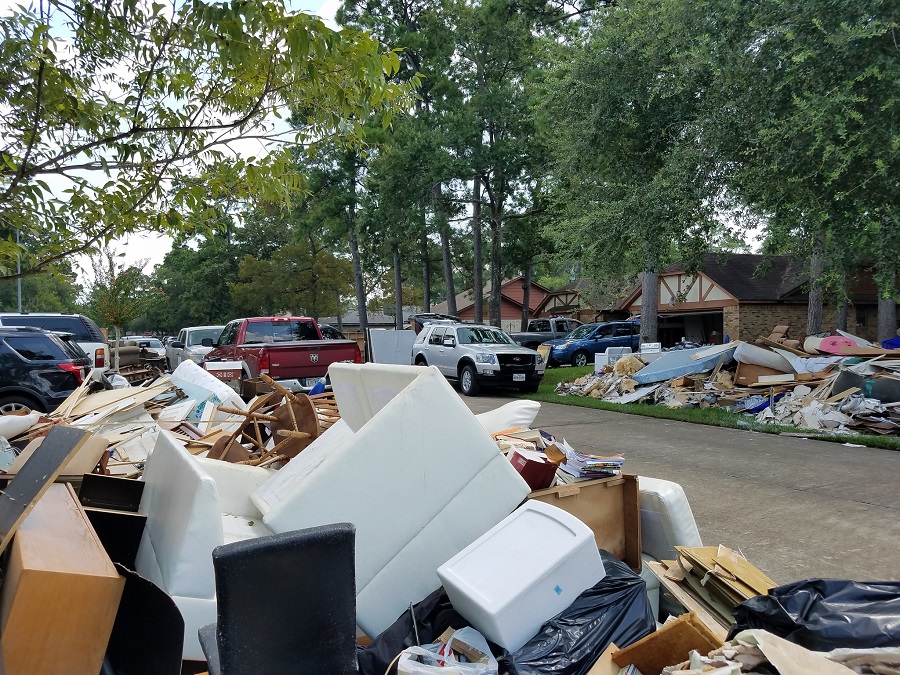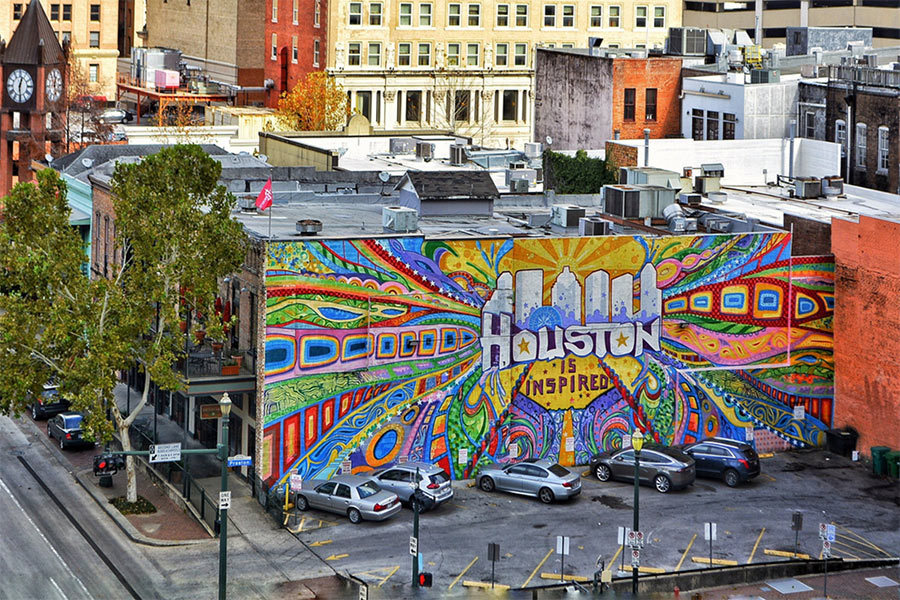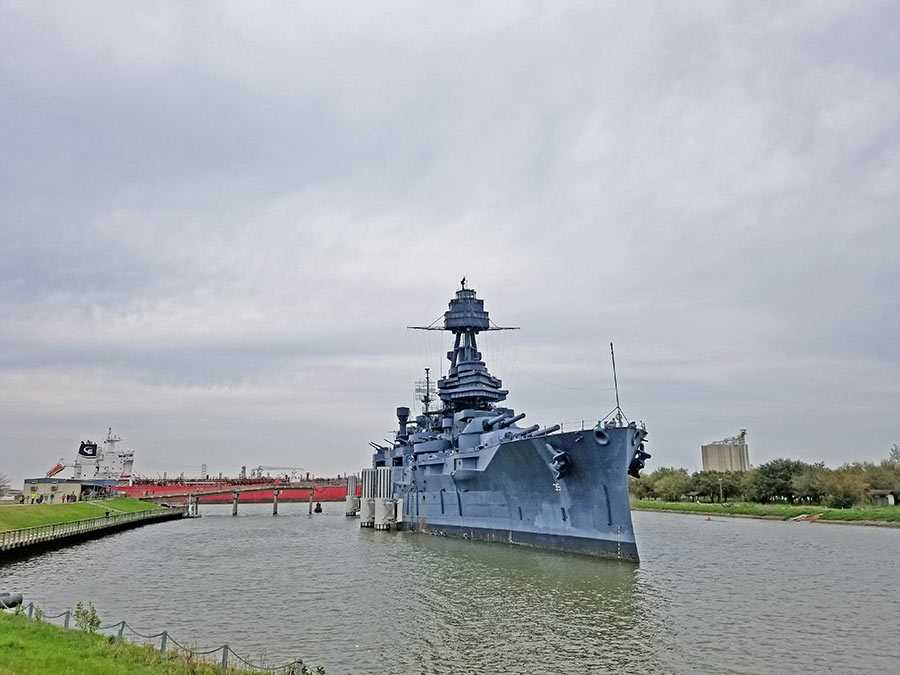
- 46 Facilities in 13 Gulf Coast Counties Released Hazardous Pollutants Because of Hurricane Harvey [New York Times; previously on Swamplot]
- Metro Flood Damage Includes Kashmere Transit Facility [Houston Public Media]
- Harvey’s Effect on Houston Realtors [American-Statesman Staff]
- Inside the Flooded, Moldy St. James Place Apartments on Fondren, the Rent Is Due [Houston Press]
- Extent of Floodwater Contamination Largely Unknown in Houston [The Texas Tribune]
- Texas Energy Industry on the Mend from Hurricane Harvey [New York Times]
- Cleaning Up Mountains of Trash from Hurricane Harvey Could Take Months [CBS News]
- Houston Restaurants Slow To Bounce Back from Harvey as Customers Deal with Cleanup, Traffic [Houston Press]
- John Biggers Mural at Blue Triangle Multi-Cultural Association in Third Ward Damaged During Harvey [Houston Chronicle]
- Residents Near Addicks and Barker Reservoirs Confront Officials at Town Hall Over Decisions to Flood Neighborhoods Along Buffalo Bayou [Reuters]
- Inside the Rescue of the La Vita Bella Assisted Living Home [Galveston County Daily News ($)]
- An Update from New York Times Correspondent Clifford Krauss, Whose Bellaire Home Flooded [New York Times]
- Texas City ISD’s Annexation of La Marque ISD Further Complicated by Harvey [The Texas Tribune]
- Houston’s Big Opportunity for Better Urban Development Post-Harvey [CityLab]
- What Houston’s Recovery Could Look Like in Practice [Wired]
- Harvey Exposed Inadequacy of Houston’s Flood Management Strategy [Houston Chronicle]
- How Houston’s Lack of Zoning Could Help It Recover [The Urban Edge]
- What the Dutch Can Teach the World About Managing Floods [CBC Radio]
- How Elevation Works in Overbank Flooding Versus Street Flooding [Watershed Texas]
- Houston Struggles After Loss of Countless Cars [AP]
- What Happens To All Of The Flooded Cars After Hurricane Harvey [Jalopnik]
- Video: Harvey Flood Rescues in Houston [Beme News]
- Why Houston Could House Amazon’s Second Headquarters [HBJ ($)]
- Johnston Marklee, Designers of the Menil Drawing Institute, and the Next Generation of Famous Architects [New York Times]
- Downtown Houston Got on The Rustic Co-Owner Pat Green’s Radar After 2011 Show at Discovery Green [Houston Press]
Photo of Pinehurst, Baytown: Marc Longoria via Swamplot Flickr Pool
Headlines





My house is a future tear-down, so I track prices of lot-value only properties in my neighborhood. These had been going recently for $50/sq ft. Today a big corner lot in a flood-prone area (1%) is listed for $36/sq ft. Yikes!
Councilman Travis was certainly stirring the pot at that resident’s meeting about flooding from dam releases. He used second-hand hearsay instead of facts to whip the crowd into a frenzy. The truth will come out, but the reality is that he’s not an engineer, one (or both) of the dams was already spilling over, and people who live downstream from a dam should really have flood insurance. Good luck with that lawsuit.
I think it’s unfortunate – and foreboding – that Amazon’s search for a second HQ begins just as the Harvey cleanup begins. There is absolutely no point in building a tech-esque HQ for a shipping-based industry leader if everything has to grind to a halt whenever there’s a big rainstorm.
.
If this new HQ lands in Texas it seems like DFW would be ideal…I remember reading somewhere (a survey from a while back, I don’t remember where) that execs in general love DFW for whatever reason.
.
Amazon also has close ties to the military and for such people DFW culturally is a much better fit than Seattle (and Seattle and the Northwest in general will probably continue to be an extraordinarily poor fit for Amazon across-the-board).
@anon22 – Pretty much any major metro area in the US could “grind to a halt” due to acts of nature. DFW has terrible ice storms every few years that shut down every road in the metroplex – you can’t even walk on your sidewalk because the ice gets so thick on every paved surface. They’re also in tornado alley. Also, if Seattle isn’t working for Amazon, it’s hard to notice given their exponential success to date.
IF DFW got 50 inches of rain it would grind to a halt. The cities pretty much stop when it ices over.
We all know that Amazon’s second HQ will be somewhere in DFW. Come on, now. If you want to know what their logic is, just read articles about it in the Washington Post, which they own. They’re an increasingly diversified logistics company with a tech platform and a retail front end, and they want access to lots and lots of cheap labor. That’s DFW, not Houston. They’re just feigning interest in other cities to try and get Dallas or one of its suburbs to cough up a big incentive.
.
Consider Amazon’s stated preferences: 1) A metro area with one million or more residents; 2) A stable and business-friendly environment; 3) An urban or suburban location with the potential to attract and retain strong technical talent; 4) Communities that “think big” when considering locations and real estate options; 5) Close proximity to a major international airport; and 6) Access to mass transit.
.
Houston botches #2, and not just for being disaster-prone. Houston’s near-term and long-term fate is inexorably linked to energy prices, and never mind what the economic development cheerleaders tell you. It is not stable. Dallas’ economy is highly diversified and much more stable, basically tracking the fate of the national/global economy. It has numerous retail, tech, and logistics companies headquartered there at every scale and level of sophistication, and those people are already there. If Amazon goes to a million-person city, they’re still so big that they’ve made it into a bit of a ‘company town’. That’s not the dynamic they would want. They’re sick and tired of having to recruit people into Seattle and keep them there; they want to be a drop in the bucket, the same way as Exxon enjoys being a drop in the bucket in Houston while maintaining its corporate offices in another city. Amazon’s bucket is DFW, though, plain and simple.
anon22: Dude, Houston just got a biblical level storm. I don’t think a company is going to make a long term decision based on it. Just as I don’t think compaines are fleeing California due to the ‘big one’ (earth quake) that will come at some point.
I agree with Niche, DFW is definitely is the driver’s seat on the Amazon deal; the only criterion where they’re weak is mass transit (their light rail ain’t that great and their bus service is bad). Plano and Frisco have shown great willingness to throw all kinds of $ at major corporations, and the state will find a way to chip in too. Workforce is not an issue there, probably the most important of the criteria. Plus excellent air service.
Re: Amazon
Not sure if the company would move to TX considering we are a deep conservative state. They are used to a liberal haven being in the PNW. I do now our tax breaks would be good for the company though. Maybe our “bathroom bills” would scare them away?
@HEBisBetterthanKroger Dude, they’re building a million SF warehouse in Brookshire, on top of two they already have here — not to mention whatever they already have in Austin and Dallas. The virtue signaling over the silly bill (which died in Austin) aside, they’re going to go where it is best for them to do business. The rest is just PR.
Well there is a huge difference between a distribution warehouse and a headquarters. The former is basically min wage jobs; the latter is almost guaranteed to force wages upward for technical and professional positions in and around the area where it is built.
Anyway Amazon is finally seeing some real competition in the cloud space and I think the company wants to hold onto its large and lucrative govcloud and secret military-industrial contracts while meanwhile its margins get crushed on the consumer side.
.
So placing this second HQ in a conservative region will appeal to military types culturally (a group that includes many current and future employees). Basically it is PR to hold onto the world’s biggest client (and one which has expanded tremendously much like Amazon).
Let me know how Amazon plans to defeat the porch thieves. Until then the having your crap dumped at your door market will soon cap out.
It’s not just the commitments to having Fulfillment Centers in TX. Those came about pretty quickly after an issue over sales taxes was resolved in court. Amazon needs them to serve customers.
.
Amazon bought Whole Foods; and that headquarters will remain in Austin, so Texas is hardly blacklisted. Blue Origin, Bezos’ company that deals in rockets, built its first spaceport in west Texas. Blue Origin also recently chose Huntsville, AL for its manufacturing center. Both of these developments makes perfect sense because if you want to build rocket engines then you should go to a place with a deep deep background in that sort of thing, Huntsville is it, and if you want government contracts then you play nice with legislators from Alabama and Texas. Jeff Bezos has proved again and again, as have so many other tech leaders, that he is willing to be politically agnostic in order to further his business objectives.
.
As for his employees’ preferences, I don’t see the ‘red state’ issue as being a problem at all. If anything, it’s a plus for them because having two headquarters locations that are ostensibly separate-but-equal means that they can (to some extent) do internal transfers for people that just can’t stand being in a place that they perceive has a different political identity than their own. And they’ve really emphasized the fact that the Seattle area is essentially unwilling to accommodate growth; they need a pro-growth metropolitan area that they can count on as staying pro-growth for a long time. Phoenix is hemmed in by federal land, Minneapolis is interesting but too damn cold, neither Austin or San Antonio have busy-enough airports, and Nashville doesn’t have enough major corporate headquarters of any sort or a major airport. St. Louis would’ve been a good choice about 40-some-odd years ago; and why take a chance on the Rust Belt?
.
To that end, I see DFW as a forerunner, with maybe Denver or Atlanta having a shot. Denver has some advantages that are specific to telecommunications companies, but that’s really the sort of thing that a small operations group and a data center could handle in most cases and there aren’t a lot of other headquarters offices there. Corporate headquarters are all about RAW UNRESTRICTED ACCESS TO CHEAP HIGHLY-QUALIFIED LABOR. Atlanta has a lot of that, but its industry clusters aren’t nearly as strong of a fit to logistics/tech/retail. If Amazon was a restaurant chain or especially a producer of multimedia content, then yeah Atlanta could give DFW a very very solid run for its money. If it was big on finance, then maybe Charlotte. If it were deeply and existentially tied to the federal government, like a defense contractor, then D.C.-Baltimore. If it were any kind of energy company, then Houston. Amazon is a little bit of all of those things, but DFW is Amazon’s corporate soul mate.
Or maybe Amazon is going to Amazon-ify the consulting business (like a cross between IBM and KPMG, something along those lines) and stage it at a HQ2. Even in this regard, DFW is ahead of the pack.